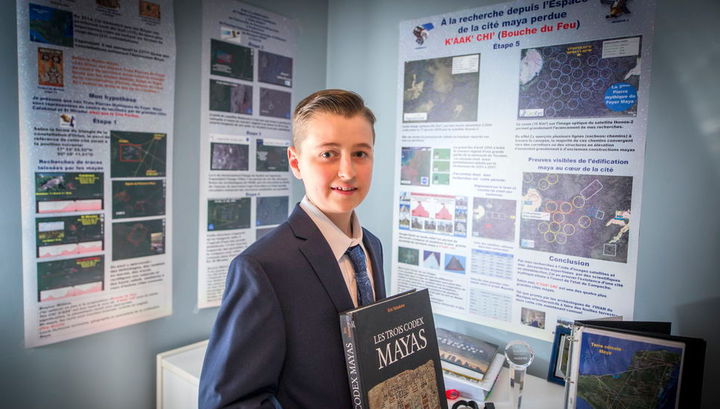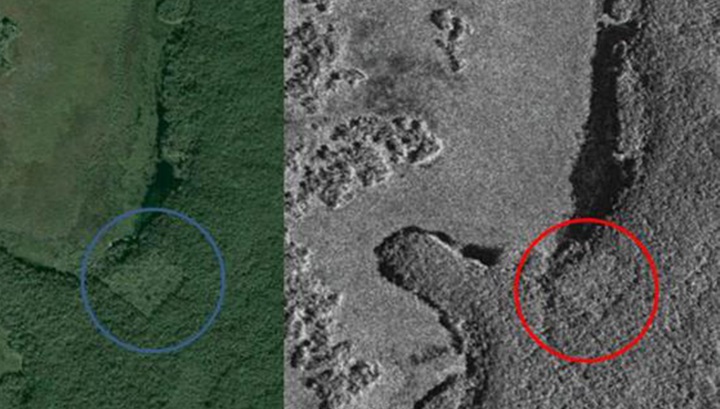Several independent scientists issued a denial of the fact that a Canadian student found the lost city of the Maya. Recall that recently the foreign, and then by the Russian media published the news that a fifteen-year student from Quebec William Gaduri (William Gadoury) found an ancient Mayan city, studying satellite imagery and ancient maps of celestial bodies.
The young man I came to the conclusion that the Mayan tribes built their structures in accordance with the arrangement of the stars, but one of the constellations “is not enough city.” Then Gaduri began studying satellite images of the Canadian Space Agency (CSA) and Google Maps and “discovered” the desired city in the territory of the Mexican state of Yucatan. Teenager even gave it a name – K’aak Chi ( “mouth of fire”)
The pictures really viewed geometric forms that could be taken for the ruins of the pyramids.. Archaeologists and anthropologists immediately expressed interest in finding, moreover, that such a method of investigation had never been used in science, and project coordinator at the Canadian Space Agency Danielle De Lisle (Daniel De Lisle) acknowledged that the territory in which, presumably, is unknown Mayan city, it is difficult to investigate because of the dense vegetation. In addition, the agency placed the boys congratulation on his official website.

However, the triumph did not last long: a teenager theory scientists have disagreed for many years researching the history and geography of the Mayan tribes. For example, Jeffrey Brasvell (Geoffrey Braswell) University of California, San Diego, told the media that he has long been working with students is on a designated area of the jungle. “It’s either abandoned corn fields, or the current field with hemp And on another satellite image you can see the outlines of dried swamp.”, – The archeologist said, noting that in this region is an active cultivation of cannabis
The anthropologist David. Stuart (David Stuart) from Mesoamerican center of the University of Texas at Austin wrote in his now remote post on Facebook about this as follows: “this whole mess – a terrible example of pseudoscience, affecting internet in freefall this is the same obscurantism, like a Rorschach test.” .
The scientist suggested that the satellite imagery could be Milpa – cornfield fallow (this method of farming is extremely common in this area). In addition, Stewart said that the Mayans never built the city according to the constellations.
He joined the opinion of colleagues and Thomas Harrison (Thomas Garrison), a specialist in anthropology from the University of Southern California. After analyzing the images and character of vegetation on them, he said, that the detected objects are abandoned 10-15 years ago corn field

The idea of the construction of the ancient cities the stars spoke out categorically one of the founding donors include the Avon archaeoastronomy professor Anthony (Anthony Aveni) from Colgate University in Hamilton, NY. “Those Mayan constellations that we know of, except in the constellation Scorpio, in no way connected with the modern maps of the constellations”, – he said
Do not remain aloof and European scientists: Ivan Shpraych (Ivan Šprajc) from. Institute of anthropology in Slovenia argues that it is impossible to carry out the correspondence between the constellations and the points on the map of the Earth. “Very few of the constellation of the Maya have been identified, and even in these cases we do not know exactly how much and what kind of stars are included in each constellation.
But we know a few environmental factors that influenced the location of the Mayan settlements, and because the idea of correlating them with the stars is very unlikely “-. said researcher
It seems that finally prove or disprove the hypothesis of the student will be able to only the expedition, but now finding the lost city in this point the scientific community is almost impossible <. / p>
In defense of the Canadian student add that a global response, of course, does not do him honor. However, interest in the subject, of course, commendable. In the end, the Internet has taken on faith gross errors and prominent scientists.
No comments:
Post a Comment